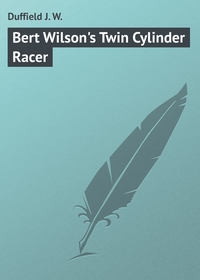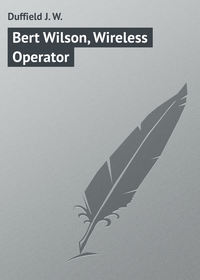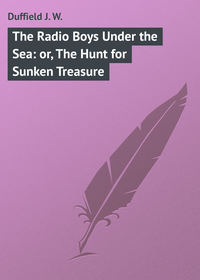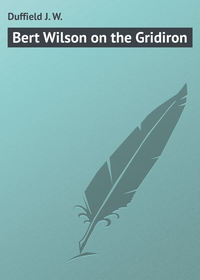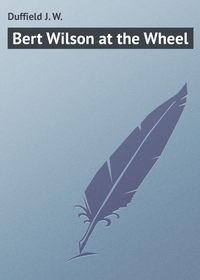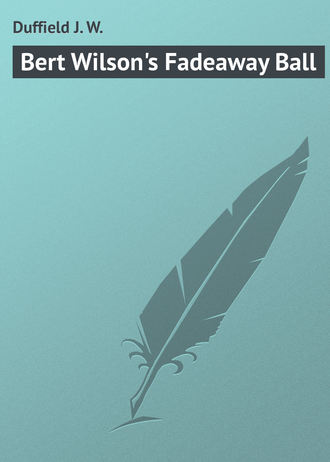 полная версия
полная версияBert Wilson's Fadeaway Ball

J. W. Duffield
Bert Wilson's Fadeaway Ball
CHAPTER I
Touching Second
Crack! – and the ball soared into center field, while the batter, swift as a flash, sped down to first. A tremendous roar went up from the thirty thousand loyal “fans” who packed the grandstands and filled the bleachers to overflowing. Staid citizens danced up and down like howling dervishes, hats were tossed into the air or jovially crushed on their owners’ heads, and happy riot reigned everywhere. Pandemonium broke loose.
The fight for the pennant had been a bitter one all season. First one team and then another had taken the lead, while the whole country had been as excited as though the fate of an empire hung in the balance. The third chief contender, fighting grimly to the last, had fallen hopelessly behind, and the contest had narrowed down to a life-and-death struggle between the Giants and the Cubs. The team from the Western city had hung on doggedly and every battle had been fought “for blood.” Contesting every inch, they had at last drawn up on even terms with the leaders, and to-day’s game was to decide which club should be hailed as champions of the National League and, later on, do battle with the leaders of the American League for the proud title of Champions of the World.
The excitement was intense, and, to a foreigner, would have been inconceivable. Men stood in line all the night before to make sure of tickets when the gates should open in the morning. The newspapers devoted columns of space to the gladiators of the opposing teams. Delegations poured in on special trains from neighboring cities. The surface cars and elevated trains, packed to the limit, rolled up to the grounds and deposited their sweltering throngs. The lines of ticket buyers extended for blocks, and the speculators did a rushing business. Long before the hour set for the game to begin, the grounds were crowded to suffocation, and thousands, unable to get in, were turned away from the gates.
The scene within was inspiring. A band played popular airs, while those within hearing joined lustily in the chorus. The great field, gleaming like green velvet beneath the afternoon sun, had been especially groomed and rolled for this day of days. The base lines, freshly marked, stood out in white and dazzling relief. All four sides of the huge enclosure held their thousands of enthusiasts, and the host of special policemen had their hands full to keep them from encroaching on the diamond. As each white-uniformed athlete of the home team came from the club house for preliminary practice, he was boisterously and affectionately greeted.
Nor did the gray-clad visitors come short of a cordial reception. The great crowd hoped that the home team would win, but they were fair, and, mingled with the good-natured chaffing, was a wholesome respect and fear of their prowess. Above all they wanted a rattling game and a hair-raising finish, with the Giants winning “by an eyelash.”
The bell rang. The Giants took their places in the field and the umpire cried “Play ball!” The head of the Cubs’ batting order came to the plate and the game was on. From the start it was a battle “for keeps.” Both teams were “on their toes.” It meant not only honor but lucre. The winners would contest in the World’s Series, and this meant thousands of dollars for every player. Every point was bitterly fought, and plays were made that under other circumstances would not even have been attempted. For eight innings, Fortune divided her favors equally, and it looked as though the game were destined to go into extra innings.
The Cubs were easily disposed of in their half of the ninth, and the Giants came to the bat. The crowd, which had been alternately on the heights of hope or in the depths of despair, rose to their feet and cheered them wildly. The batters were frantically besought to “hit it on the seam,” “give the ball a ride,” “show them where you live.” The players responded nobly. By the time that two were out, a Giant was perched on third and another on first. The shortstop, a sure hitter in a pinch, strode to the plate. Now, indeed, excitement was at fever heat. A safe hit into the outfield would bring the man on third to the plate with the winning run.
The visitors were plainly worried. The “Peerless Leader” came in from first, ostensibly to advise the pitcher, but really to give him a moment’s rest before the final test. Hoots of derision showed the spectators’ appreciation of the trick. The pitcher glanced at the man dancing about third, wound up deliberately and let the ball go with all the force of his brawny arm. The batter caught it squarely “on the trademark” and shot it like a rifle bullet into center field, while the man on third tore down the line and came like a racehorse to the plate. He crossed the rubber with the winning run, and thirty thousand men went stark, raving mad.
The man on first ran part way toward second, and then, seeing that his comrade would certainly score, turned and scurried to the club house in right field. The jubilant crowd began to invade the diamond. Suddenly the second baseman of the visitors secured the ball, rushed to his base, and then, surrounded by his teammates, ran toward the umpire, waving his hands wildly.
The crowd, at first bewildered, then angered, soon became panic-stricken. Few of them understood the nature of the claim. They only felt that the hard-won victory was being called in question, and a tidal wave of wrath and resentment swept over the field.
The point made by the quick-witted second baseman was simple, but sufficiently important to engage the grave attention of the umpires. His contention was that the man on first had not touched second base, and, as he was legally compelled to leave first in order to make room for the batter and had not touched second before the ball got there, he was forced out, and therefore the run didn’t count. The rules on this point were clear and explicit. If the claim was granted, three men were out, no run had come in and the score was still a tie at one to one.
The final decision was held in suspense, and the throng passed out, more like a funeral than a triumphal procession. Disputes were rife among heated partisans, and in all the vast city that night and, in a lesser degree, in every city from New York to San Francisco, the game was fought over and over again. The unfortunate first baseman almost lost his mind over the blunder. There was more pity than bitterness felt toward him, however, as it was known that he had merely followed a general custom that had been taken as a matter of course.
Among the crowd that filed out of the gates were Bert Wilson and his inseparable friends, Dick Trent and Tom Henderson. With them also was a Mr. Hollis, a gentleman much older than they in years, but quite as young in spirit. He had been in charge of the summer camp from which the boys had recently returned, and the respect and confidence that his sterling character evoked had become steadily stronger. They were all very fond of the great national game, and had shared the enthusiasm over the supposed victory of the home team. Now, from the reaction, their ardor was correspondingly dampened.
“There’s no use talking,” broke out Tom hotly, “it was a low down trick. They couldn’t beat us with the bat, so they try to do it on a quibble.”
“I don’t know,” said Dick, “it’s about a stand off. We may have been a little bit better off in brawn, but they had it on us in the matter of brain. Whatever we may think of their sportsmanship, their wits were not wool gathering.”
“And after all,” chimed in Bert, “it is brain that counts to-day in baseball as well as in everything else. More and more, the big leaguers are putting a premium on quick thinking. The mere ‘sand lot slugger’ is going to the rear, and the college man is coming to the front. It isn’t that the collegian is necessarily any brainier, but he has been taught how to use his brains. This is simply a case where the husky hit of the Giants’ short-stop was wasted because of the nimble wit of the Cubs’ second baseman. It was hit against wit, and wit won out.”
“All the same,” maintained Tom, “it was taking advantage of a technicality. The same thing has been done a hundred times, and there has never been a kick about it. Whenever a player has been sure that the winning run has come in, he has considered it all over, and made a break for the clubhouse. I don’t think the question has ever been raised before.”
“Yes it has,” said Mr. Hollis. “That same quick thinker made a point of it the other day in Pittsburgh, and that is all the more reason why the home team ought to have been wide awake. But there is nothing to be gained by post mortems, and anyway the thing isn’t settled yet. It looks rather bad for us now, but there will be a full discussion of the matter and the umpires may find something in the rules that will cover the case and give us the run. Even if they don’t, it leaves it a tie, and the game will have to be played over. We may win then and get the pennant after all.”
“I hope so,” said Tom, “but just at present I know how they felt in Mudville:
“‘O somewhere birds are singing and somewhere children shout,But there’s no joy in Mudville – mighty Casey has struck out.’”A few days later when the point had been decided in favor of the Cubs and the game played over, only to result in a conclusive victory for the men from the shore of Lake Michigan, the chums met in Bert’s rooms.
“Well,” said Dick, “I see that they put it over, all right. They’ve copped the pennant and we are only an ‘also ran.’”
“Yes,” replied Tom, “that hit by Tinker over Seymour’s head did the business. But there’s no use crying over spilt milk. We’ll stand them on their heads next year and get even.”
“By the way, Bert,” asked Dick, changing the subject, “have you heard from your examinations yet? How did you make out?”
“Fine,” answered Bert. “I heard from the Dean this morning and he says that I passed with something to spare. The chemical and electrical marks were especially good. He says that the questions along those lines were unusually severe, but they didn’t strike me that way. I suppose it’s because I’m so interested in them that they come easy.”
“Good for you, old scout,” cried Dick, delightedly. “I’m tickled to death that the thing is settled. You’ll find that we have one of the finest scientific schools in the country. I’ve been there a year now, and it’s come to seem like home. I’ll show you the ropes and we’ll room together. I only wish Tom here were coming along with us next week.”
“So do I,” said Tom ruefully, “but Father seems to think I’d better stick to my engineering course right here in New York. It isn’t that he thinks the course is any better than at your college, if as good. I suppose the real reason is that he wants me to be where I can live at home. I’m going to get Mr. Hollis to have a talk with him. Perhaps he can show him that it would be a good thing for me to get away from home and be thrown on my own responsibility. Dad’s pretty stubborn when he gets an idea in his head, but he thinks a lot of Mr. Hollis, and what he says will go a long way with him.”
It was a wholesome group of young fellows that thus discussed their future plans. They were the best type of manly, red-blooded American youth, full of energy and ambition and alive to their finger tips. Tom was of medium height, while Bert and Dick were fully six feet tall. All were strongly built and looked as though they could give a good account of themselves in any contest, whether of mind or body. A similarity of tastes and habits had drawn them closely together, and among their friends they were jokingly referred to as the “Three Guardsmen.” They were rarely apart, and now their plans for the coming school year were destined to cement their friendship still more firmly. In reality with them it was “one for all and all for one.”
All of them had chosen their life work along practical and scientific lines. The literary professions did not tempt them strongly. Dick, who was the elder, was preparing to become a mining engineer, and had already spent a year at college with that end in view. Tom aimed at civil engineering while Bert was strongly drawn toward electrical science and research. This marvelous field had a fascination for him that he could not resist. His insight was so clear, he leaped so intuitively from cause to conclusion, that it was felt that it would be almost a crime if he were not permitted to have every advantage that the best scientific schools could give him. For a long time past he had been studying nights, preparing for his entrance examinations, and now that he had passed them triumphantly, nothing intervened between him and his cherished ambition.
Absorbed as he was in his studies, however, he spent enough time in athletic sports to keep himself in superb physical condition. His was the old Greek ideal of a “sound mind in a sound body.” His favorite sport was baseball, and, like most healthy young Americans, he was intensely fond of the great game. In public school and high school he had always “made the team.” Although at times he had played every position in the infield and outfield and behind the bat, he soon gravitated towards the pitcher’s box, and for the last three years had played that position steadily. He was easily the best “flinger” in the Inter-Scholastic League, and had received more than one invitation to join some of the semi-professional teams that abound in the great city. He elected, however, to remain purely and simply an amateur. Even when a “big league” scout, who had watched him play, gave him a quiet tip that his club would take him on the Spring training trip to Texas and pay all his expenses, with a view to finding out whether he was really “major league timber,” the offer did not tempt him. He had no idea of making a business of his chosen sport, but simply a pleasant though strenuous recreation. With him, it was “sport for sport’s sake”; the healthy zest of struggle, the sheer physical delight in winning.
And now, as they talked over the coming year, the athletic feature also came to the fore.
“I wonder if I’ll have the slightest show to make the baseball team,” said Bert. “I suppose, as a newcomer I’ll be a rank outsider.”
“Don’t you believe that for a minute,” replied Dick warmly. “Of course there’ll be lots of competition and a raft of material to pick from. I suppose when the coach sends out the call for candidates in the Spring, there’ll be dozens of would-be players and a bunch too of have-beens that will trot out on the diamond to be put through their paces. One thing is certain, though, and that is that you’ll get your chance. There may be a whole lot of snobbery in college life – though there isn’t half as much as people think – but, out on the ball field, it’s a pure democracy. The only question there is whether you can deliver the goods. If you can, they don’t care whether you’re a new man or an old-timer. All they want is a winner.”
“Well,” chimed in Tom, “they’ll find that they have one in Bert. Just show them a little of the ‘big medicine’ you had in that last game with Newark High when you put out the side on three pitched balls. Gee, I never saw a more disgusted bunch of ball tossers. Just when they thought they had the game all sewed up and put away in their bat bag, too.”
“That’s all right,” said Bert, “but you must remember that those high school fellows were a different proposition from a bunch of seasoned old college sluggers. When I come up against them, if I ever do, they’ll probably smash the back fences with the balls I feed to them.”
“Some of them certainly can slaughter a pitcher’s curves,” laughed Dick. “Old Pendleton, for instance, would have the nerve to start a batting rally against three-fingered Brown, and Harry Lord wouldn’t be hypnotized even if Matty glared at him.”
“I understand you did some fence breaking yourself last Spring on the scrubs,” said Tom. “Steve Thomas told me you were the heaviest batter in college.”
“O, I don’t know,” returned Dick modestly, “I led them in three-base hits and my batting average was .319, but Pendleton was ahead of me in the matter of home runs. I hope to do better next Spring, though, as Ainslee, the coach, gave me some valuable tips on hitting them out. At first I swung too much and tried to knock the cover off the ball. The result was that when I did hit the ball it certainly traveled some. But many a time I missed them because I took too long a swing. Ainslee showed me how to chop at the ball with a sharp, quick stroke that caught it just before the curve began to break. Then all the power of my arms and shoulders leaned up against the ball at just the right second. Ainslee says that Home-Run Baker uses that method altogether, and you know what kind of a hitter he is. I got it down pretty fine before the season ended, and if I make the team next Spring – ”
“If you make it,” said Bert incredulously. “As though it wasn’t a dead certainty.”
“Not a bit of it,” protested Dick, seriously. “You never can tell from year to year. You can’t live on your reputation at college. There may be a regular Hal Chase among the new recruits, and he may win the first base position over me without half trying. It’s a good thing it is so, too, because we have to keep hustling all the time or see somebody else step into our shoes. The result is that when the team is finally licked into shape by the coaches, it represents the very best the college can turn out. It’s a fighting machine that never knows when it is whipped and never quits trying until the last man is out in the ninth inning.”
“Yes,” broke in Tom, “and that’s what makes college baseball so much more pleasing than the regular professional game. The fellows go at it in such deadly earnest. It is the spirit of Napoleon’s Marshal: ‘The Old Guard dies, but never surrenders.’ The nine may be beaten, but not disgraced, and, when the game is over, the winning team always knows that it has been in a fight.”
“Well,” said Bert, as the fellows rose to go, “if we do make the team, it won’t be through lack of trying if we fail to land the pennant.”
“No,” laughed Dick. “Our epitaph at least will be that of the Texas cowboy,
“‘He done his blamedest – angels can no more.’”A week later, the three friends – for Tom and Mr. Hollis had won his father over – stood on the deck of a Sound steamer, saying goodby to those who had come to see them off. Mr. Hollis wrung Bert’s hand, just as the last bell rang and he prepared to go down the gangway.
“Good luck, Bert, and whatever else you do, don’t forget to touch second.”
He smiled at Bert’s puzzled expression, and added: “I mean, my boy, be thorough in all you do. End what you begin. Don’t be satisfied with any half-way work. Many a man has made a brilliant start, but a most dismal finish. In work, in play, in the whole great game of life – touch second.”
CHAPTER II
“Making the Team”
The Fall and Winter passed quickly. Bert and Dick roomed together in one of the dormitories close to the main buildings, while Tom had his quarters on the floor below. The feeling of strangeness, inevitable at the start, soon wore off, and they quickly became a part of the swarming life that made the college a little world of its own.
Here, too, as in the greater world outside, Bert found all sorts and conditions. There were the rich and the poor, the polished and the uncouth, the lazy and the energetic, good fellows and bad. But the good predominated. The great majority were fine, manly fellows, sound to the core. Dick’s wide acquaintanceship with them and his familiarity with college customs were immensely helpful to Bert from the beginning, and he was soon a general favorite.
The football season had been a triumphant one, and another gridiron championship had been added to the many that had preceded it. There had been a surplus of good material left over from the year before, and the time was so short that Bert had not tried for the team. At the outset, too, his studies taxed him so heavily that he did not feel justified in giving the necessary attention to the great game, that, in his estimation, almost divided honors with baseball. He had done a little playing with the scrubs, however, and on his class team, and the qualities he displayed in “bucking the line” had marked him out to the coaches, as a factor to be reckoned with in the following seasons.
The Christmas holidays had come and gone almost before he knew it, and when he returned for his second term, he buckled down to work with all his might. His chosen field of electricity held constant surprises for him, as it became more familiar. If he had any specialty, it was wireless telegraphy. There was an irresistible attraction in the mysterious force that bound the ends of the earth together by an electric spark, that leaped over oceans with no conductor but the air, that summoned help for sinking vessels when all other hope was gone. He felt that the science was as yet only in its infancy, and that it held untold possibilities for the future. The splendidly equipped laboratories gave him every opportunity and encouragement for original work, and his professors foresaw a brilliant future for the enthusiastic young student.
Spring came early that year. A soft wind blew up from the south, the sun shone warmly on the tender grass, the sap stirred blindly in the trees. It stirred also in the veins of the lusty college youth and called them to the outdoor life.
Going down the hall, one morning, to his recitation room, Bert came across an eager group surrounding the bulletin board. He crowded nearer and saw that it was the call of the coach to baseball candidates to report on the following day. His heart leaped in response and the morrow seemed long in coming.
Dressed in the old baseball togs that had done yeoman service on many a hard-fought field, he with Dick and Tom, who were quite as eager as himself, reported for the tryout. Perhaps a hundred ambitious youngsters were on hand, all aflame with desire to make the team and fight for the glory of Alma Mater. It was apparent at a glance, however, that many had ambition but nothing else. The qualities that had made them heroes on some village nine were plainly inadequate, when it came to shaping up for a college team. The hopes of many faded away when they saw the plays made by the seasoned veterans, who nonchalantly “ate up” balls and did stunts in practice that would have called out shouts of applause in a regular game. But whether marked for acceptance or rejection, all were as frolicsome as colts turned out to pasture. It was good to be young and to be alive.
The coach threaded his way through the groups with an eye that apparently saw nothing, but, in reality, saw everything. He was a famous pitcher, known from one end of the country to the other. Himself an old-time graduate, he had the confidence of the faculty and the unbounded respect and admiration of the students. He had been given full charge and was an absolute autocrat. Whatever he said “went,” and from his decision there was no appeal. He played no favorites, was not identified with any clique, and his sole desire was to duplicate the success of the preceding season and turn out a winner.
To do this, he realized, would be no easy task. While his two chief rivals had maintained their strong teams almost intact, his own was “shot to pieces.” Three had graduated, and they were among his heaviest hitters. Good old Pendleton, who had been a tower of strength at first base, who could take them with equal ease to right or left and “dig them out of the dirt,” and whose hard slugging had many a time turned defeat into victory, would be hard to replace. His pitching staff was none too good. Winters lacked control, and Benson’s arm was apt to give out about the seventh inning. Hinsdale was a good backstop, but his throwing to second was erratic. They had done too much stealing on him last year. Barry would be sadly missed at third, and it would be mighty hard to find a capable guardian for the “difficult corner.” It was clear that he faced a tough problem, and the only solution was to be found, if at all, in the new material.
As he glanced musingly around his eyes fell on Bert. They rested there. He knew a thoroughbred when he saw one, and this was undeniably a thoroughbred. The lithe form, supple as a leopard’s, the fine play of shoulder muscles that the uniform could not conceal, the graceful but powerful swing, the snap with which the ball shot from his fingers as though released by a spring – all these he noticed in one practised glance. He sauntered over to where Bert was pitching.


